

The Australian Moment by George Megalogenis. 'Likely to become the essential short work on modern Australia' Don Watson 'Megalogenis is Australia's best explainer … A brilliant read' Annabel Crabb Winner of the 2013 Prime Minister's Literary Award, 2012 Walkley Book Award, and Australia's bestselling political book of 2012 There's no better place to be during economic turbulence than Australia.
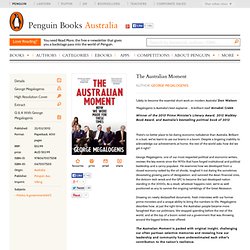
Brilliant in a bust, we've learnt to use our brains in a boom. Despite a lingering inability to acknowledge our achievements at home, the rest of the world asks: how did we get it right? Drawing on newly declassified documents, fresh interviews with our former prime ministers and a unique ability to bring the numbers to life, Megalogenis describes how, at just the right time, the Australian people became more farsighted than our politicians. 'This man is perhaps the sanest journalist in Australia. 'Megalogenis has the rare gift of being both comprehensive and detailed. 'Stimulating ... 'Lucid and flowing ... 'Wise, considered and incisive ...
Are we in danger of becoming a great country? - Meganomics Blog. Australian Exceptionalism. “Australian Exceptionalism”…. let that phrase roll off your tongue.
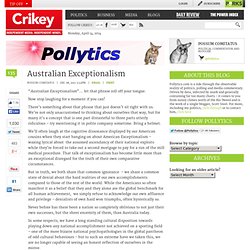
Now stop laughing for a moment if you can! There’s something about that phrase that just doesn’t sit right with us. We’re not only unaccustomed to thinking about ourselves that way, but for many it’s a concept that is one part distasteful to three parts utterly ridiculous – try mentioning it in polite company sometime. Bring a helmet. The Soft Economy - Australia. It is strange that for a given set of economic statistics, there are so many interpretations of how well the economy is performing.
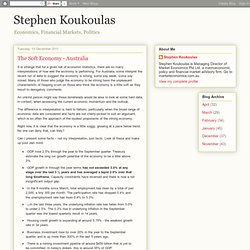
For Australia, some interpret the recent run of data to suggest the economy is strong, some say weak, some say mixed. Many of those who judge the economy to be strong have the unpleasant characteristic of heaping scorn on those who think the economy is a little soft as they resort to derogatory comments. An unkind person might say those boneheads would be wise to look at some hard data, in context, when assessing the current economic momentum and the outlook.
The difference in interpretation is hard to fathom, particularly when the broad range of economic data are considered and facts are not cherry-picked to suit an argument, which is so often the approach of the loudest proponents of the strong economy. Right now, it is clear that the economy is a little soggy, growing at a pace below trend. Can I present some facts – not my interpretation, just facts. Our economy is a dream. The debate is a nightmare - The Drum Opinion. Find More Stories Our economy is a dream. The debate is a nightmare Ben Eltham Blogger Scott Steel - aka Possum Comitatus - published a widely-read post last week. Entitled " Australian Exceptionalism ", he trawled through the available economic data to show just how wealthy Australia has become in recent decades. Australia has grown much faster than the countries we are normally compared to: the United States, the United Kingdom, Japan, Canada – nearly every member of the OCED and the EU, in fact.
"Our poorest 10 per cent of households experienced faster income growth than any country other than Spain and Ireland," Steel pointed out. A friend of mine returned from a couple of years studying in Amsterdam this week. "I'm finding it hard not to fall in love with Australian lifestyle again," she told me. Riding the tsunami. Hen the Treasurer was told the news of Australia's economic growth rate for the first quarter of this year, Wayne Swan had just one word to say - an unprintable four-letter expletive starting with the letter F.
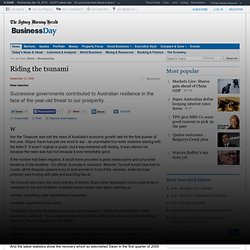
It wasn't original or poetic, but it was delivered with feeling. It was uttered not because the news was bad but because it was remarkably good. If the number had been negative, it would have provoked a great media outcry and a hundred iterations of the headline - It's official: Australia in recession. Malcolm Turnbull would have had to muster all his thespian powers to try to look worried in front of the cameras, while his inner politician was hooting with glee and punching the air. Advertisement Yet it would have been the most ordinary of events. Instead, something quite extraordinary happened. The Luckiest Country is... The Australian model for Europe? Europe seems to face a pretty simple choice.
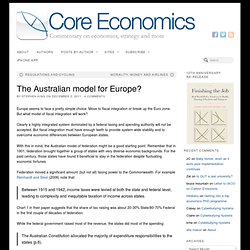
Move to fiscal integration or break up the Euro zone. But what model of fiscal integration will work? Clearly a highly integrated system dominated by a federal taxing and spending authority will not be accepted. But fiscal integration must have enough teeth to provide system-wide stability and to overcome economic differences between European states. With this in mind, the Australian model of federation might be a good starting point.
Federation moved a significant amount (but not all) taxing power to the Commonwealth. Between 1915 and 1942, income taxes were levied at both the state and federal level, leading to complexity and inequitable taxation of income across states. Chart 1 in their paper suggests that the share of tax raising was about 20-30% State/80-70% Federal in the first couple of decades of federation.